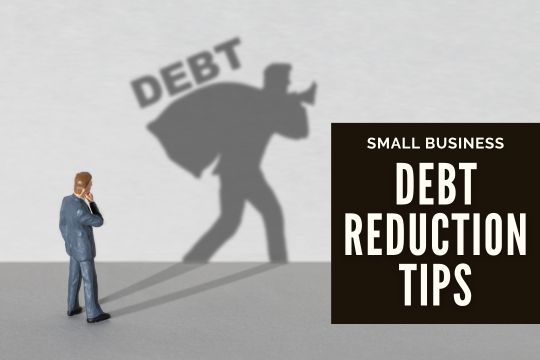
Unsustainable debt can sink a small business faster than that glacier sank the Titanic. Fortunately, by knowing the right signs to look for and strategies to avoid them, you can reduce your current small business debt and prevent accruing insurmountable debt in the future.
There are many signs that your business debt has gotten out of control, including:

Any one of the below suggestions alone can help you reduce small business debt measurably. Combined, they can help you reduce that debt significantly and avoid building it back up again.
Review your budget as it currently stands, then revise it as necessary to eliminate unnecessary debts. Learn to run your business within your means. If you must take on debt, make sure you know what it’s for and how and when you’ll be able to repay it.
To best do this, take an inventory of all your debt. Look through the bank and credit card statements from the past year or a few months to itemize expenses. Identify:
Next, analyze your revenues. Whether you're reviewing your existing budget or devising one from scratch if you don’t have one already, here are some key points to look for:
To be successful, a small business should have a certified public accountant helping them track and analyze revenues and costs. The trick is finding the right CPA for your small business. Learn what to look for and ask around in your industry for referrals to quality CPAs to consider.

You may be making payments automatically each cycle without even realizing it. By making yourself aware of all your expenses and how and when they get paid, you can adjust them as necessary to reduce costs.
Examine every expense and classify it according to these distinctions:
There’s nothing you can do about essential and non-negotiable expenses. However, you can lower essential but flexible costs by negotiating lower rates and fees from your existing suppliers or providers or switching to new, lower-cost suppliers or providers. You can also eliminate unnecessary expenses.
By choosing and sticking to a debt reduction strategy, you can reduce small business debt almost on autopilot. Here are two of the most common strategies for reducing small business debt:
Whatever strategy you choose, it’s almost always best to pay down your most essential and highest-cost debt first.
Just because you have to pay some expenses, that doesn’t mean they have to cost you as much in interest and fees. You can consolidate all your debt into a single payment, often at a lower interest rate and with fewer and/or lower fees.
There are at least two other benefits of consolidating your diversified debts into a single debt. One is that your original debtors are paid off, putting you in good standing with them. Another is that you only have to keep track of one recurring payment rather than many, helping you avoid missed payments and late payment fees.

By automating debt payments, you also avoid missed payments and late-payment fees, as well as harming your business credit score, which would make it harder for your small business to qualify for future funding. Automating debt payments also helps you avoid negatively impacting your small business’s cash flow.
Two powerful ways to reduce small business debt are to save money by economizing expenses and making repayment more efficient. Another is to increase the income you’re generating to pay these debts. That way, you can pay them down quicker and, ultimately, cheaper by avoiding unnecessary interest charges.
Fortunately, there are at least as many ways to boost revenue as to economize expenses. Here are some of the key ones:

Another powerful way to boost revenue and cut expenses is to seek other sources of funding than debt. Two of these sources are investors and grants.
Many investors may expect some sort of ownership stake or share of profits in your business but not expect you to repay their investment dollar-for-dollar on a particular schedule with interest. These investors only succeed in reaping benefits from their investment if you succeed in your business. There are also angel investors who expect nothing in return but the satisfaction of helping you succeed in your small business.
There are also many small business grants you can apply for that never have to be repaid and don't require you to give up any of your business ownership or profits to the grant provider.
Contact us right away to discuss how review management software can help you and your small business achieve debt freedom by boosting your small business revenue.
Missing or late payments, using new loans to cover existing ones, a falling business credit score, and shrinking borrowing options all signal that your company's debt is becoming unmanageable.
A fresh budget reveals where money really goes. By recording every debt, fee, interest rate and revenue stream, you can curb unnecessary spending, set realistic payment goals and direct surplus cash toward principal.
Two popular methods are the Spartan strategy, which covers only essential expenses until debts shrink, and the Percentage strategy, which allocates a fixed profit share to repayments, prioritising high-cost obligations first.
Consolidating merges multiple loans into one, often with a lower interest rate and fewer fees. It simplifies tracking, restores good standing with old creditors and reduces the risk of missed or late payments.
Beyond trimming expenses, raise cash by attracting new customers, expanding product or service lines, cross-selling, upselling, courting investors or securing grants that require no repayment, helping you attack principal faster and save on interest.